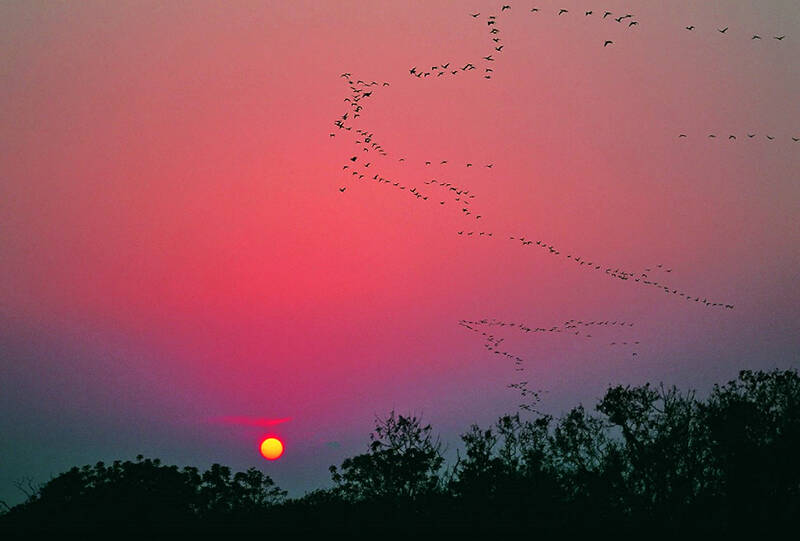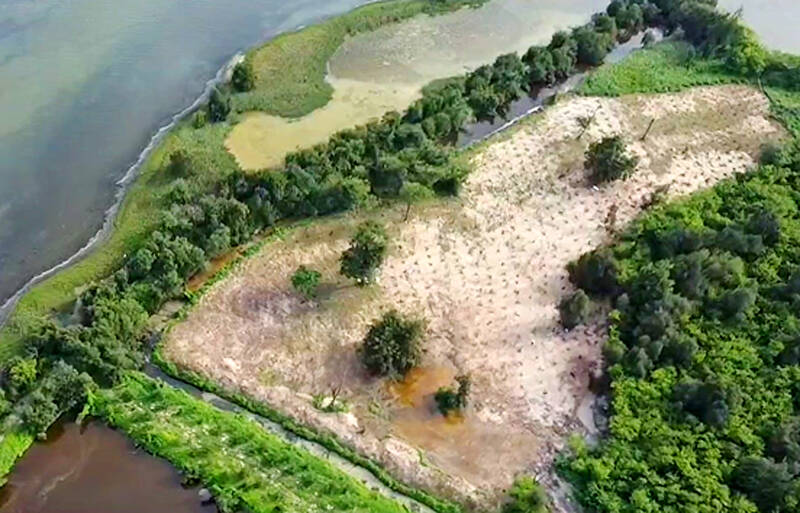Every winter in Kinmen, thousands of cormorants can be seen at dawn and dusk, forming V-shaped or straight lines in the sky as they return to their roosts. This spectacular “black-clad army” descending upon Kinmen is one of the park’s most iconic ecological sights. These visitors from southern Siberia have become a top bird-watching attraction for birdwatchers. What is not widely known is that over the past two years, the Kinmen National Park Headquarters (KMNP) has been dedicated to a series of long-term habitat restoration efforts to prevent the disappearance of the ecological spectacle of the “black army” of cormorants in Kinmen.
Located on the edge of the Eurasian continent, Kinmen serves as a key stopover for migratory birds in East Asia. Each year, from autumn to late spring, large flocks of migratory birds fly south to Kinmen to feed and pass through, with an impressive variety and abundance of species. While Taiwan’s main island has recorded 674 bird species across 87 families, Kinmen, with an area half the size of Taipei City, is home to over 430 species, 74% of which are migratory.
Despite the rich bird diversity, over 20 years of monitoring by the KMNP has revealed a decline in cormorant numbers visiting Kinmen in the past five years. The population have dropped from 11,330 in 2020, to 9,583 in 2021, 8,553 in 2022, 7,721 in December 2023, and 7,517 by mid-January 2024, marking four consecutive years below 10,000.

Photo credit: Kinmen National Park Headquarters, Photographer: Liao Dong-kun
KMNP commissioned Professor TING Tsung-Su from the Department of Forestry and Resource Conservation at National Taiwan University to conduct a three-year study (2020–2022) on cormorant migration and ecology in Kinmen. The report highlighted the severe impact of Typhoon Meranti in September 2016, which significantly damaged Kinmen’s casuarina trees, a crucial roosting species for cormorants. The storm reduced forested areas, and invasive species and habitat fragmentation further dispersed the cormorants’ roosting sites. Some even shifted to nearby Xiamen for nighttime roosting.
Cormorants prefer tall forests near water for roosting. Professor Ting recommended that degraded public lands in key roosting areas within Kinmen National Park be restored by removing invasive species like Leucaena and Morning Glory, and replanting hardy, fast-growing Casuarina seedlings.
For privately-owned lands, such as those near fishponds, he suggested developing ecosystem service payment plans and ecological compensation mechanisms to encourage landowner participation in habitat restoration. Monitoring methods should also be dynamically adjusted to provide timely ecological data and implement adaptive management strategies.

Photo credit: Kinmen National Park Headquarters
KMNP places great emphasis on the conservation of cormorants, continuously monitoring their numbers and behavior while prioritizing habitat restoration at Ci Lake since 2023. Efforts include removing invasive species like Morning Glory and Leucaena from degraded habitats, alongside planting over 2,600 trees, such as Casuarina and Melaleuca, to create a more suitable roosting environment. These actions aim to ensure cormorants return year after year.
Birds are vital indicators of environmental health, with their abundance reflecting the diversity of the ecosystem, and they are an essential resource for sustainable tourism in Kinmen. As habitats shrink, food webs become simpler, and the ecosystem’s natural regulatory functions diminish, highlighting the importance of habitat restoration, especially in the face of extreme weather events that pose significant challenges to maintaining island ecosystems.

An essay competition jointly organized by a local writing society and a publisher affiliated with the Chinese Communist Party (CCP) might have contravened the Act Governing Relations Between the People of the Taiwan Area and the Mainland Area (臺灣地區與大陸地區人民關係條例), the Mainland Affairs Council (MAC) said on Thursday. “In this case, the partner organization is clearly an agency under the CCP’s Fujian Provincial Committee,” MAC Deputy Minister and spokesperson Liang Wen-chieh (梁文傑) said at a news briefing in Taipei. “It also involves bringing Taiwanese students to China with all-expenses-paid arrangements to attend award ceremonies and camps,” Liang said. Those two “characteristics” are typically sufficient

A magnitude 5.9 earthquake that struck about 33km off the coast of Hualien City was the "main shock" in a series of quakes in the area, with aftershocks expected over the next three days, the Central Weather Administration (CWA) said yesterday. Prior to the magnitude 5.9 quake shaking most of Taiwan at 6:53pm yesterday, six other earthquakes stronger than a magnitude of 4, starting with a magnitude 5.5 quake at 6:09pm, occurred in the area. CWA Seismological Center Director Wu Chien-fu (吳健富) confirmed that the quakes were all part of the same series and that the magnitude 5.5 temblor was

The brilliant blue waters, thick foliage and bucolic atmosphere on this seemingly idyllic archipelago deep in the Pacific Ocean belie the key role it now plays in a titanic geopolitical struggle. Palau is again on the front line as China, and the US and its allies prepare their forces in an intensifying contest for control over the Asia-Pacific region. The democratic nation of just 17,000 people hosts US-controlled airstrips and soon-to-be-completed radar installations that the US military describes as “critical” to monitoring vast swathes of water and airspace. It is also a key piece of the second island chain, a string of

The Central Weather Administration has issued a heat alert for southeastern Taiwan, warning of temperatures as high as 36°C today, while alerting some coastal areas of strong winds later in the day. Kaohsiung’s Neimen District (內門) and Pingtung County’s Neipu Township (內埔) are under an orange heat alert, which warns of temperatures as high as 36°C for three consecutive days, the CWA said, citing southwest winds. The heat would also extend to Tainan’s Nansi (楠西) and Yujing (玉井) districts, as well as Pingtung’s Gaoshu (高樹), Yanpu (鹽埔) and Majia (瑪家) townships, it said, forecasting highs of up to 36°C in those areas